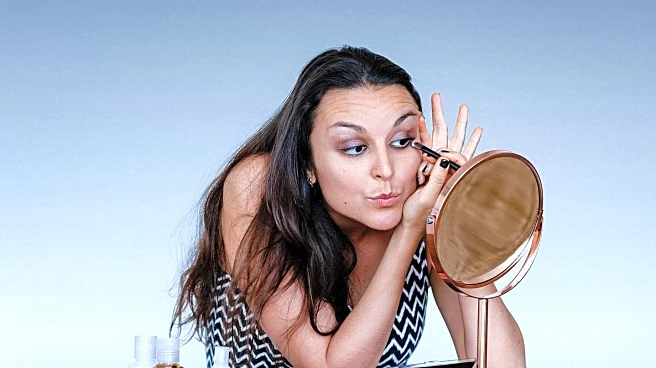What's Happening?
The cosmetics industry is witnessing a surge in innovation aimed at addressing hair loss, a prevalent concern affecting a younger demographic. According to data from Philip Kingsley, a British trichological hair and scalp care brand, nearly half of individuals experiencing noticeable hair loss are aged between 18-34 years. This trend is accompanied by a high incidence of hair shedding, with 91% of this age group reporting significant hair loss in the past year. The impact on self-esteem is notable, as 61% of those surveyed indicated that hair loss negatively affects their confidence, and 57% reported that it influences their hairstyle choices. Gustav Fouche, a hair and scalp health expert, attributes the rise in hair loss among youth to inadequate nutrition, highlighting the industry's efforts to combat this issue through innovative products.
Why It's Important?
The increasing prevalence of hair loss among younger individuals is significant as it challenges traditional perceptions that hair loss primarily affects older populations. This shift has prompted the cosmetics industry to develop targeted solutions, potentially leading to a broader range of products designed to cater to younger consumers. The psychological impact of hair loss, affecting self-esteem and personal appearance, underscores the importance of effective treatments. As the industry responds to these needs, companies that successfully address hair loss may gain a competitive edge, influencing market dynamics and consumer preferences. The focus on innovation could also drive advancements in related fields, such as nutrition and wellness, as experts emphasize the role of diet in hair health.
What's Next?
As the cosmetics industry continues to innovate, the development of new products and treatments for hair loss is expected to expand. Companies may invest in research to better understand the underlying causes of hair loss in younger demographics, potentially leading to breakthroughs in treatment options. Collaboration with nutritionists and health experts could enhance product efficacy, offering holistic solutions that address both cosmetic and health aspects. Consumer education campaigns may also emerge, promoting awareness of hair health and the importance of proper nutrition. The industry's response to this trend could set new standards for beauty products, emphasizing the integration of health and beauty.
Beyond the Headlines
The focus on hair loss among youth highlights broader societal issues, such as the impact of lifestyle and diet on health. This trend may prompt discussions on the importance of holistic wellness, encouraging individuals to consider the interplay between nutrition, health, and beauty. Ethical considerations may arise as companies navigate the balance between marketing effective solutions and addressing the root causes of hair loss. The industry's response could influence cultural perceptions of beauty, shifting the focus from aesthetic concerns to overall well-being.











